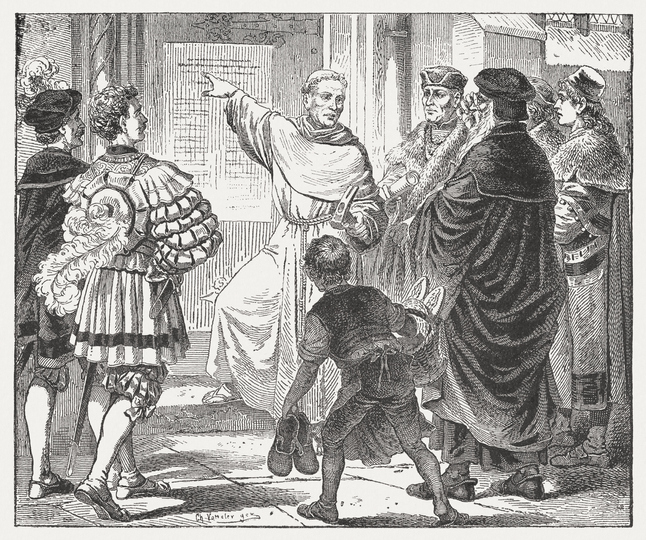
Lutheranism is one of the major branches of Protestantism. Like all Christians, Lutherans believe in the divinity of God, recognize his son Jesus Christ as the Lord and savior, and accept the Old and New Testaments of the Bible as their holy book.
Protestants formed their own branch of Christianity during the Reformation that happened in the 16th century, 1,500 years after the birth of Christ.
The Reformation was led by Martin Luther, who is the principal founder of Protestantism. He’s also the namesake of the Lutheran religion and was so revered by the early Lutherans that they adopted his name to characterize their own belief system.
Explore a Christian Ministry Degree – Request More Info Today!
And that belief system is best summarized in the key principle of Lutheran doctrine…
Salvation is achieved by the grace of God alone, through an individual’s faith alone, in Christ’s word as expressed in the Bible alone.
What Makes the Lutheran Church Different from Other Protestant Denominations?
Lutherans are distinct from other Protestant branches like Methodists, Calvinists, Adventists, Anabaptists, and Anglicans in notable ways such as:
A Lutheran church service looks similar to a Catholic service in that both use alters, have specially dressed clergy, and follow a similar liturgical structure.
Lutherans show their faith in God’s divinity, supremacy, and mercy by emphasizing their belief that God grants salvation entirely based on His will and judgment. There’s no place for the notion that people could have any influence over God’s will, a belief that’s common among other Protestant branches.
Lutherans acknowledge apparent contradictions in their faith, and even embrace them. For example, they believe both that people are bound by sin and also freed from sin because of Jesus’ sacrifice. Or that God is a God of strict justice as well as a God of mercy.
Lutherans emphasize doing good deeds in their community because God instructed people to love their neighbors, and not because they believe that doing good deeds will give them a better chance of eternal salvation in Heaven.
Lutheran church denominations whose beliefs are shared closely can join together into what is called a synod. This is not obligatory, and many Lutheran churches and denominations choose to remain independent.
Some Lutheran denominations are more conservative, some are more liberal, and some emphasize certain key doctrines over others. The broad range of bylaws and perspectives in the Lutheran church are exactly why there is such a large variety of churches and denominations within the Lutheran faith.
The Lutheran Religion Worldwide by the Numbers
There are up to one billion Protestants in the world, accounting for over a third of all Christians, and of these approximately 66 million identify as Lutherans. North America is home to approximately 8.4 million Lutherans.
In America there are more than 40 Lutheran church denominations. The two largest are:
- Evangelical Lutheran Church in America (ELCA) – Over 3.7 million members and 9,320 congregations
- Lutheran Church–Missouri Synod (LCMS) – Over 2.3 million members and 6,100 congregations
Like Other Protestant Denominations, Lutheranism Came Out of the Reformation of the 16th Century
During the Reformation, the founding of Protestantism more broadly, including the subsect of Lutheranism, was based on ideological differences with the Church of England at the time. These tenets are still held by all Protestants today:
- All Protestants reject the notion that the Pope or other clergy are somehow superior in any way over other believers in Christ.
- All Protestants believe that redemption can occur through faith alone, as opposed to a combination of faith and good deeds.
- All Protestants accept Jesus as the only official mediator between humans and God, and this principle is carried over to the rejection of a priest class who are present in other branches of Christianity such as Catholicism. Protestants believe in the priesthood of all believers. In Protestantism, pastors and ministers are equal with other members of their church in the eyes of God.
These distinguishing beliefs hold true of all Protestants. The major difference between Lutherans and other Protestants is one of emphasis. It’s the strong emphasis on these two points that distinguish Lutherans from their fellow Protestants:
- Lutherans emphasize that eternal salvation comes from believing in God’s divine grace and forgiveness and is not something that needs to be earned through actions in the world.
- Lutherans recognize the Bible as being the highest authority of God’s word, rather than considering it an equal alongside Christian tradition.









